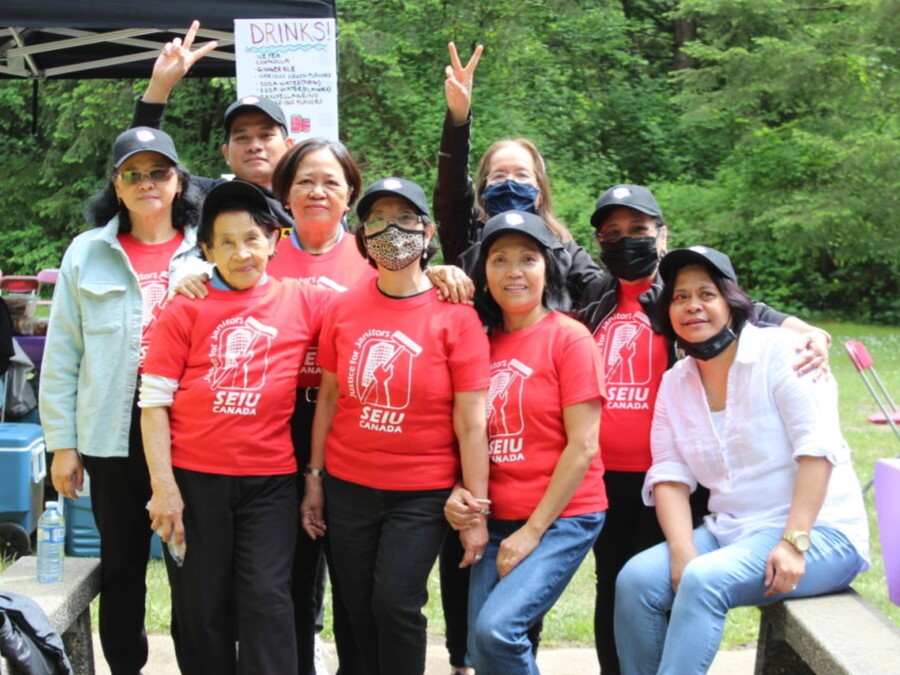SEIU Local 2 surveyed its members working in the janitorial sector to understand worker issues during the COVID-19 pandemic. The Union surveyed members from May to August. The survey was conducted in four major cities in Canada (Toronto, Ottawa, Vancouver, and Halifax). ACORN also collected answers to this same survey from non-union janitors.
Both union and non-union janitors were cleaning properties which are owned or part-owned by major pension funds, including Healthcare of Ontario Pension Plan (HOOPP), Ontario Municipal Employees Retirement System (OMERS), Ontario Teachers’ Pension Plan (OTPP), the Caisse de dépôt et placement du Québec (CDPQ), and the British Columbia Investment Management Corporation (bcIMC).
In summary, the data demonstrates that all janitors have experienced disruption in their work lives due to COVID-19. The data also demonstrates the positive and mitigating effects of unionization, especially concerning access to sick days and health benefits.
It is clear from survey results that cleaning contractors and the property owners that hire them need to do more to ensure that frontline janitors are provided with adequate working conditions so that tenants and the public-at-large are protected during the pandemic and beyond.
Paid Sick Days and Health Benefits
The difference in working conditions between union and non-union janitors came out most starkly when comparing data on access to benefits and paid sick days.
Only 14% of non-union janitors reported having access to paid sick days, compared to 69% of union janitors. 32% of non-union janitors reported having access to health benefits, compared to over 70% of union janitors.
These numbers demonstrate that unions are essential to raising standards in the janitorial industry. However, even amongst union janitors, there is still a large gap between current standards and necessary standards. All frontline and low-wage workers, such as janitors, must have access to sick days and health benefits.
Access to paid sick days and benefits is essential to control the spread of COVID-19, as recently demonstrated in a report by the Canadian Centre for Policy Alternatives.
Occupational Health and Safety
Occupational and workplace safety has come to the fore with the COVID-19 pandemic. Maintaining clean public and work spaces is now recognized as a key tool in stemming the spread of the COVID-19 virus.
Janitors were surveyed to understand which occupational health and safety measures employers were taking with the advent of the pandemic. Over 85% of both union and non-union janitors received what they deemed sufficient personal protective equipment at work, including gloves and masks.
However, a considerable portion (37%) of non-union workers did not feel able to report safety concerns without fear of punishment, versus only 27% of union workers. A higher portion (18%) of union janitors reported exercising their right to refuse unsafe work versus non-union janitors (11%).
Workload
While most non-union and union janitors reported that their workloads have increased during the pandemic, the portion of non-union janitors reporting expanded work duties was much higher than union janitors. 72% of non-union janitors said their workload had increased, versus only 55% of union janitors. A similar percent of non-union janitors (66%) and union janitors (60%) report that their employer had not added additional staff to accommodate the increased workload.
With the pandemic likely to persist into the medium-term, properties should be pushing for high levels of janitors staffing to enable sustainable workload given the increased sanitation standards now in place.
Conclusion
Unionization plays a clear and significant role in protecting janitors’ health and safety and is a clear determinant in whether janitors have access to paid sick days and health benefits. There is much to do to provide janitors with what they need to safely do their jobs: higher wages, paid sick days, and health benefits. Janitors’ working conditions are directly linked to the health and safety of tenants and the public-at-large. Property managers should hire contractors who meet adequate standards with respect to wages, sick days, and benefits.
Janitors
Speak
Out
Slim Gedeon
Janitor, Ottawa
Vilma Lopez
Janitor, Burnaby



